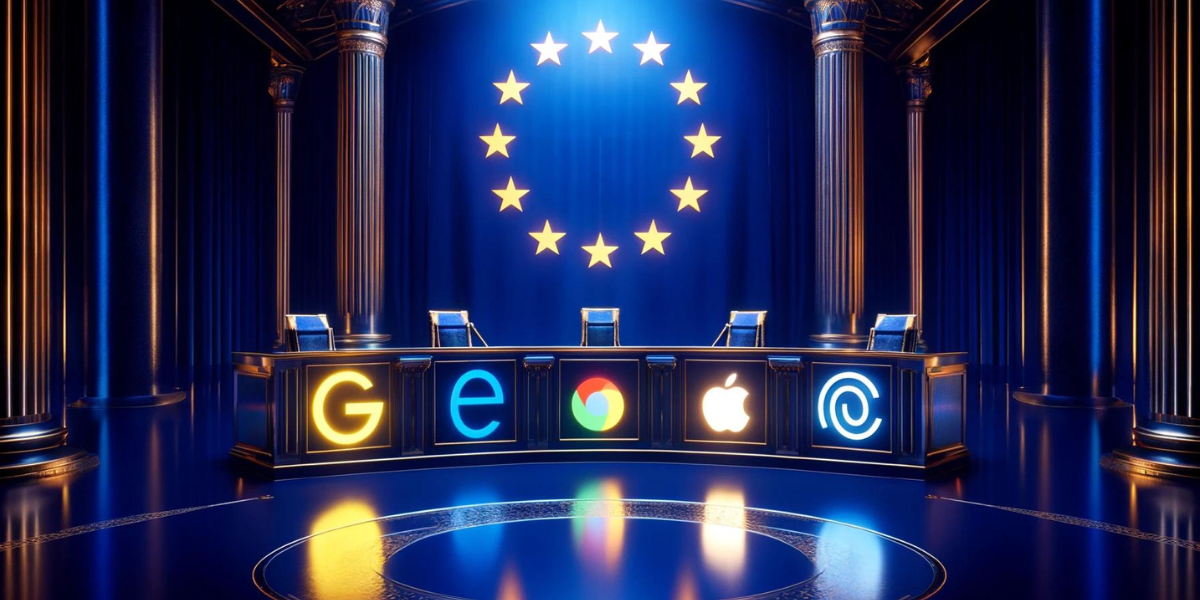|
Brussels, |
|
Alphabet, Amazon, Apple and Meta under EU investigation
Just 18 days after its entry into force, the EU's Digital Market Act triggers checks on Alphabet, Amazon, Apple, and Meta, suspected of manipulating the market in their favor, penalizing competitors and consumers.
The European Commission's swift initiation of non-compliance investigations under the Digital Markets Act (DMA) marks a pivotal moment in regulatory enforcement within the digital realm. Led by Executive Vice-President Margrethe Vestager, these actions underscore the Commission's unwavering commitment to upholding fair competition and consumer protection in the digital market. With major tech giants such as Alphabet (Google), Apple, and Meta (formerly Facebook) under scrutiny, the Commission's proactive approach highlights the urgency of addressing systemic issues and ensuring compliance with DMA provisions. This introduction sets the stage for a comprehensive examination of the Commission's enforcement efforts and their implications for the digital landscape.
Aimed at ensuring compliance with the recently approved Digital Markets Act (DMA), the European Commission has initiated its first non-compliance investigations. Executive Vice-President Margrethe Vestager announced these measures this week, marking a crucial step in enforcing the DMA's provisions and fostering fair competition in the digital sphere.
The decision of the Commission to open investigations a few weeks after the deadline for the implementation of the DMA underscores the urgency of addressing the application of European legislation towards the main players in the digital landscape, including Alphabet (Google), Apple, and Meta (formerly Facebook). The platforms that effectively control the global market and that, according to the Commission, prevent the development of an open market.
Indeed, Vestager emphasized that compliance with the DMA has become a top priority to promote open markets and benefit consumers.
The key provisions now under examination include anti-steering obligations and the opening of closed ecosystems to enable competition at all levels. Concerns have also been raised regarding the implementation of these provisions by Alphabet and Apple, particularly concerning fee structures and limitations on user choice.
The Commission's investigations also extend to Meta, focusing on potential breaches of DMA rules regarding data combination. Vestager highlighted Meta's "Subscription for No Ads" model, raising questions about the true freedom of consent granted to users in exchange for personalized advertising.
Furthermore, the Commission has launched a separate investigation against Alphabet for potential breaches of the DMA prohibition of self-preferencing. This prohibition aims to prevent gatekeepers from unfairly promoting their own services over competitors, ensuring fair treatment of third-party services.
Commissioner Breton echoed Vestager's sentiments, emphasizing the transformative impact of the DMA in just 18 days since its implementation. Breton stressed the importance of the DMA as a tool to level the playing field and empower users, asserting that compliance with DMA provisions is non-negotiable.
Looking ahead, the Commission declared to remain vigilant, with ongoing scrutiny of Amazon and Apple's business practices. Concerns persist regarding fair treatment of products on Amazon's platform and Apple's app store business model.
The Commission's enforcement actions underscore its commitment to creating a fair and competitive online environment within the Single Market. With a robust enforcement toolbox at its disposal, including innovative tools like retention orders, the Commission is poised to ensure full compliance with the DMA, signaling a new era of regulatory oversight in the digital realm.
The decision of the Commission to open investigations a few weeks after the deadline for the implementation of the DMA underscores the urgency of addressing the application of European legislation towards the main players in the digital landscape, including Alphabet (Google), Apple, and Meta (formerly Facebook). The platforms that effectively control the global market and that, according to the Commission, prevent the development of an open market.
Indeed, Vestager emphasized that compliance with the DMA has become a top priority to promote open markets and benefit consumers.
The key provisions now under examination include anti-steering obligations and the opening of closed ecosystems to enable competition at all levels. Concerns have also been raised regarding the implementation of these provisions by Alphabet and Apple, particularly concerning fee structures and limitations on user choice.
The Commission's investigations also extend to Meta, focusing on potential breaches of DMA rules regarding data combination. Vestager highlighted Meta's "Subscription for No Ads" model, raising questions about the true freedom of consent granted to users in exchange for personalized advertising.
Furthermore, the Commission has launched a separate investigation against Alphabet for potential breaches of the DMA prohibition of self-preferencing. This prohibition aims to prevent gatekeepers from unfairly promoting their own services over competitors, ensuring fair treatment of third-party services.
Commissioner Breton echoed Vestager's sentiments, emphasizing the transformative impact of the DMA in just 18 days since its implementation. Breton stressed the importance of the DMA as a tool to level the playing field and empower users, asserting that compliance with DMA provisions is non-negotiable.
Looking ahead, the Commission declared to remain vigilant, with ongoing scrutiny of Amazon and Apple's business practices. Concerns persist regarding fair treatment of products on Amazon's platform and Apple's app store business model.
The Commission's enforcement actions underscore its commitment to creating a fair and competitive online environment within the Single Market. With a robust enforcement toolbox at its disposal, including innovative tools like retention orders, the Commission is poised to ensure full compliance with the DMA, signaling a new era of regulatory oversight in the digital realm.
Read more on DMA (strategy, initiatives and legal texts)
© Copyright eEuropa Belgium 2020-2024
Source: © European Union, 1995-2024
© Copyright eEuropa Belgium 2020-2024
Source: © European Union, 1995-2024



